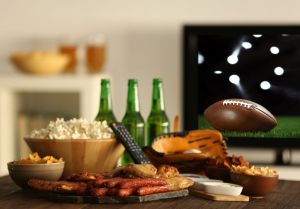It should come as no surprise that football is loud. If you’re lucky enough to have scored tickets to the big game, you’ll enjoy it in the company of thousands of excited, screaming fans at the stadium. More likely, you’ll be watching at a noisy, crowded bar or on your living room couch surrounded by enthusiastic friends.

a risk to your hearing.
What is it about the Super Bowl that prompts us to test the strength of our vocal chords? There’s something about football that brings out the noisy side of things, regardless what team you’re rooting for. Either way, preparation is important.
Plan ahead for the big game and save your hearing
If you landed a ticket to watch the New England Patriots play the Los Angeles Rams at Superbowl 53, the game will fortunately be played at the brand-new Mercedes-Benz Stadium in Atlanta. You won’t need to worry about extremely cold weather impacting your hearing aids, unless you’ll be traveling in this week’s record-setting wintry weather to get there. The stadium is ADA-equipped and has both assistive listening system and closed captioning.
Still, ear plugs should be on your list of must-take items–it will no doubt be loud. Fun fact: The Kansas City Chiefs nabbed the honor of having the loudest NFL stadium in September of 2014, a Guinness record they snatched from the Seattle Seahawks. During a Monday night game, fans clocked a 142.2 decibel (dB) reading on the sound level meter. That’s louder than a jet plane flying just a mere 100 feet overhead! In case you’re wondering, the generally accepted safe level of sound is 85 dB. Anything above that has the potential to permanently damage your hearing.
If you’re watching the game on TV…
…you can still put your good hearing at risk in even the comfort of home. Big Super Bowl parties are a sports lover’s tradition, albeit a noisy one. There’s always that one friend who is convinced the players will hear his enthusiastic cheering and guidance if only shouted loudly enough!
If you’re the host of such a gathering, control the volume of the television. If the TV speakers aren’t blaring, your guests may have to hold down their voices just a bit to hear the game, which in turn will keep the ambient room noise in check.
And, if you’re a guest or are watching at a bar and you can’t turn down the TV, just take a break from the noise every so often. Periods of low noise can ensure you don’t wake up on Monday morning with tinnitus and temporary hearing loss. Getting out of the noise is also a great excuse to visit the snack table.
Another tip: If you do notice trouble hearing on Monday morning, skip the extra large coffee. Research shows too much caffeine after a noisy event can make it harder for your ears to recover.
Football and hearing loss history
You may not know the iconic football huddle was developed by deaf football players, so it’s ironic that most people assume those who are hard of hearing or deaf don’t have the capability to play. Paul Hubbard, a quarterback for Gallaudet University, the deaf institution in Washington, D.C., formed the huddle in the 1890s so that he and his teammates could communicate plays in American Sign Language without the other team reading their hand signals.
The Arizona Cardinals are proud to have the NFL’s third deaf player and first deaf offensive lineman, Derrick Coleman. Coleman has been legally deaf since childhood due to a genetic disorder. He’s worn hearing aids his entire life and continued wearing them when he started playing football.
But the hearing aids were giving him feedback. That’s when his mother had the brilliant idea of wrapping them in panty hose. Problem solved, Coleman went on to play at UCLA and the rest was history.
Kenny Walker was the NFL’s second deaf player, as a defensive lineman for the Denver Broncos in the early 1990s. A spinal meningitis infection robbed him of his hearing as a toddler, but Walker went on to win the title of the NFL’s most inspirational player. The honor of the very first deaf player in the NFL goes to Bonnie Sloan, who played one season with the St. Louis Cardinals in 1973. In high school, his football coach didn’t even want to let him try out at first.
Wherever you’ll be enjoying the big game this year, keep your hearing health top of mind. And, if you suspect you already have a hearing loss, visit a hearing healthcare professional near you. With improved hearing, you’ll not only enjoy watching Super Bowl games even more, you’ll enjoy every day in between much more too!
